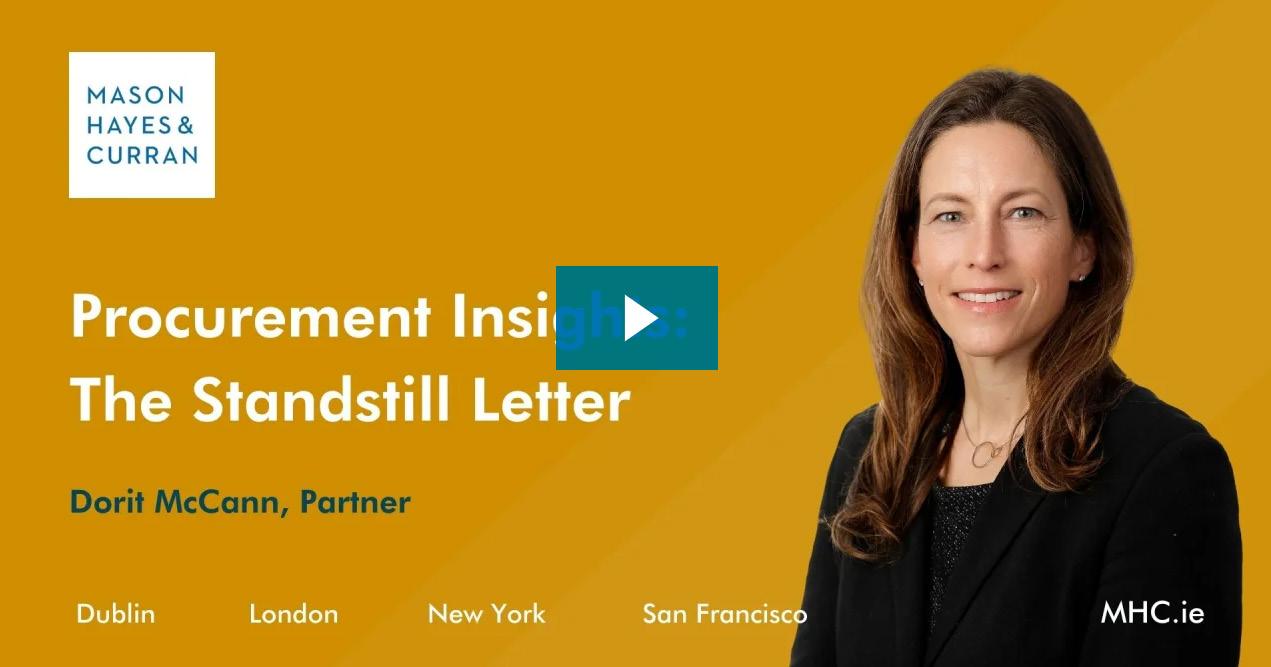Energy Sector Update
In Brief
Q2 2024

Welcome

Welcome to the spring edition of our Energy Sector Update series. In this issue, we examine a selection of topics and trends impacting our clients.
First up, in the above video, Head of Public Procurement, Dorit McCann outlines why the award decision letter, or standstill letter, is one of the most important documents in the procurement process.
Other popular insights featured in this edition include:
• The key dates and next steps for the provisional RESS 4 auction timetable
• The introduction of new data centre sustainability reporting obligations
• A recent Supreme Court decision on public information access which could potentially impact private energy generators
• A cautionary tale for arbitration practitioners and lawyers
Please feel free to contact me or another member of our Energy Sector team if you wish to discuss these topics or any other issues impacting your organisation.

Eoin Cassidy Partner, Energy Sector Lead ecassidy@mhc.ie
Contact our Energy Sector team
2 Energy Sector Update - In Brief
RESS 4 - Provisional Auction Timetable Published
 Peter McLay Partner, Energy
Peter McLay Partner, Energy
The Irish Government is running the fourth onshore auction under the Renewable Electricity Support Scheme (RESS 4). As with its predecessors, it aims to assist Ireland in reaching its goal of generating 80% of electricity from renewable sources by 2030, with targets including 9GW of onshore wind and 8GW of solar photovoltaic capacity.
Provisional RESS 4 auction timetable
The provisional timetable for the RESS 4 auction was published on 4 April 2024 by the Department of Environment, Climate and Communications (DECC) and EirGrid. The provisional timetable sets out the proposed key dates for the auction process, including qualification, bidding and the announcement of results.
The key temporary dates and timelines for RESS 4 are:
• Qualification application window: open from 10:00 on 20 May 2024 until 17:00 on 4 June 2024.
• Provisional qualification decision date: this will be published on 4 July 2024.
• Final application withdrawal date: 8 July 2024.
• Final qualification decision date: 26 July 2024.
• Bidding window: running from 10:00 on 22 August 2024 until 12:00 on 28 August 2024.
• Provisional auction results date: 9 September 2024.
• Final auction results date: 25 September 2024.
This provisional timetable should be helpful to prospective applicants and participants in RESS 4 who are planning their engagement with the auction process. The final version of the timetable is expected to be published on 1 May 2024.
Terms and Conditions still pending
We recently published an article regarding the consultation process around the terms and conditions of RESS 4, which closed for submission in late March. At the time of writing, the terms and conditions have not yet been published, although this is expected imminently.
It is hoped that publication of the final RESS 4 Terms and Conditions will settle any residual uncertainty around the timing of publication of any technologyspecific price cap, and whether this will leave auction participants with the ability to withdraw in the event that they consider the cap level to be inconsistent with project viability.
Next steps
The final RESS 4 auction timetable is expected to be published on 1 May 2024, and the final RESS 4 Terms and Conditions during this month of April 2024.
DECC’s provisional timetable is available here
3 Energy Sector Update - In Brief Financial Services Sector Update - In Brief
pmclay@mhc.ie
AIE Obligations for Renewable Energy Operators?


The Supreme Court’s decision in Right to Know CLG v Commissioner for Environmental Information and Raheenleagh Power DAC [2024] IESC 7, delivered on 6 March 2024, has been highly anticipated in the renewable energy industry given the considerable significance for private companies operating within this sector.
A question raised in this case is whether a private renewable energy company, in this case Raheenleagh DAC (RP), could be subject to the environmental information regulatory regime. This regime imposes significant obligations on ‘public authorities’ to disseminate and make available, upon request, ‘environmental information’. If RP is found to be a public authority, this will place significant obligations on renewable energy developers to disseminate and make “environmental information” available, on request. However, the Supreme Court has not decided the issue. Instead, it has referred the matter back to the Commissioner for Environmental Information for determination. In this article, we analyse the Supreme Court decision and explain what this means, in practical terms, for private companies operating in the renewable energy sector during this period of continued uncertainty.
Definition of a ‘public authority’ under the AIE Regulations
The Directive and the AIE Regulations define a ‘public authority’ to include a body which meets one or more of the following three limbs:
• Government or other public administration, including public advisory bodies, at national, regional or local level
• Any natural or legal person performing public administrative functions under national law, including specific duties, activities or services in relation to the environment, and
• Any natural or legal person having public responsibilities or functions, or providing public services, relating to the environment under the control of a body or person falling within (a) or (b)
It was agreed by all parties that RP was not a ‘public authority’ within the meaning of the first limb, so the debate centred around the interpretation of paragraph (b) and (c).
The Supreme Court decision
In brief summary, in January 2021, the High Court determined that RP is a private energy generation project and was subject to the European Communities (Access to Information on the Environment) Regulations 2007 (AIE Regulations). This was because it satisfied the definition of a “public authority” under that legislation. The Court of Appeal overturned that decision. Further analysis of these decisions is available in our previous articles - High Court and Court of Appeal
4 Energy Sector Update - In Brief Financial Services Sector Update - In Brief
Deirdre Nagle Partner, Head of Planning & Environment dnagle@mhc.ie
Lisa Joyce Partner, Public, Regulatory & Investigations ljoyce@mhc.ie
The Supreme Court stated that it would not give any “decided or binding views on issues that were not previously argued before and decided by the Commissioner at first instance” but considered it appropriate to indicate the approach that should be taken.
The Supreme Court’s comments suggest that generating electricity from renewable sources could be viewed as serving a public interest. This is especially true if the generation is part of a State aid program. With this in mind, it seems that the Supreme Court’s position is that a private renewable energy generator could be a ‘public authority’ under the AIE Regulations.
Key takeaways
The following key points from the Supreme Court judgment will be highly instructive going forward, even in the absence of a final determination:
Is electricity generation a service of public interest?
• The fact that RP generates renewable energy is a “key feature” of its operations which “could be relevant to any determination as to whether the company is engaged in the provision of a public service” for the purpose of limb (b) and/or (c). This is on the basis that renewable generators are treated “quite differently” under EU and national legislation to a producer using nonrenewables, in that they may be eligible for State aid price support regimes, such as the REFIT scheme in RP’s case.
• The Supreme Court disagreed with the Court of Appeal’s finding that the generation of electricity was no longer a service in the public interest because it is a ‘voluntary or optional’ activity. The suggestion that a service can only be considered in the public interest if it is, in effect, compulsory, goes too far.
What does it mean to be ‘entrusted’ with the performance of services of a public interest for the purpose of ‘limb (b)’?
• The CJEU’s use of the term ‘entrusted’ in the Fish Legal1 test for limb (b) of the ‘public authority’ definition is important and should not be disregarded. It implies that there must be “some level of obligation” regarding the performance of services of a public interest. However, as noted, this does not necessarily imply the need for there to be a “compulsion to provide a predetermined level or form of service”.
What will constitute ‘special powers’ for the purpose of ‘limb (b)’?
• The relevant powers should not be considered in isolation but must be considered in the context of the purpose for which they have been vested in the entity. There is “little point in examining the disputed powers without regard to the nature of the purpose for which they have been conferred.” To meet the ‘limb (b)’ test, the powers must not only go beyond normal private law rules but must also be vested for the purpose of performing services of a public interest.
• In the case of RP, it will be necessary to analyse the terms of its licence and authorisation under the Electricity Regulation Act 1999 Act. The Supreme Court did not have these documents before it so was unable to conclude on this point.
• “Great care” should be taken in considering powers granted under a licence. The fact that powers are vested through a licence does not necessarily mean that they are ‘special powers’ vested for the purpose of performance of services of public interest; “a great many occupations and businesses can only be pursued with a licence, under a statutory scheme of regulation, but they will not necessarily be covered by the directive”.
1 Fish Legal and Shirley v. Information Commissioner & Ors (C-279/12)
5 Energy Sector Update - In Brief
• The fact that further authorisation or approval is required from a regulatory body to exercise the relevant powers is “significant” but not “necessarily decisive”.
What will constitute ‘control’ by a public authority for the purpose of ‘limb (c)’?
• This is a “mixed question of fact and law” which cannot be determined “by reference simply to the question whether a shareholder owns more than 50% of the issued shares.” Rather, it requires an investigation into the “ownership, management and actual operation of the company at the relevant time”. This had not been carried out by the Commissioner regarding RP.
Implications for renewable energy developers and operators
With the Court of Appeal decision, there was a clear and resounding ‘no’ to the question of whether a private renewable energy company was a ‘public authority’ for the purpose of the AIE Regulations.
Following the Supreme Court’s decision, the renewable energy industry no longer has this certainty or reassurance. What is clear from the Supreme Court’s decision is that a private company generating electricity from renewable sources could fall within the scope of the AIE Regulations, and therefore the obligations in the AIE Regulations must be considered by private energy generation developers and operators.

6 Energy Sector Update - In Brief
New Data Centre Sustainability Reporting Obligations


The European Commission has adopted a new delegated regulation (the Regulation) establishing an EU-wide reporting scheme to rate the sustainability of data centres. The Regulation places significant obligations on data centre operators to report on certain sustainability criteria. We consider the implications of the Regulation for data centres in Ireland and outline what data centre developers need to do to ensure compliance.
According to the European Commission, data centres are estimated to account for almost 3% of EU electricity demand. In Ireland, EirGrid previously estimated that by 2031, 28% of all electricity demand is expected to come from data centres and other new large energy users.
In the context of Ireland’s national emissions targets and climate obligations, these statistics have given rise to public debate on the energy demands of data centre development. There have been several recent refusals by local authorities to grant planning permission for data centres, as well as numerous challenges to grants of permission.
The new recast Energy Efficiency Directive, (EU) 2023/1791, was adopted in 2023 as part of the EU’s plan to reduce its net greenhouse gas emissions by at least 55% by 2030. The Directive contains some reporting obligations for data centre operators under Article 12. However, at the time of writing these are not yet effective in Ireland as the Directive has not yet been transposed. Under Article 12 of the Directive, Member States must require data centre operators to make the information set out in Annex VII of the Directive publicly available (subject to limited exceptions).
The information required includes details such as the:
• Location
• Floorspace
• Power demand, and
• Performance of the data centre against sustainability key performance indicators (KPIs)
The deadline under Article 12 is 15 May 2024 and every year thereafter, although this is subject to the Directive being transposed by Ireland.The Commission has identified this Regulation as the “first phase” in the establishment of an EU-wide scheme to rate the sustainability of data centres. The Energy Efficiency Directive leaves it open to the Commission to adopt further delegated acts to supplement the Directive. The Directive identifies that these delegated acts may relate to adaptations to values or calculations, etc. These are required to reflect technical progress, or more generally the establishment of the data centre sustainability rating scheme. As such, it is not yet clear exactly what the Commission intends as the next phase of the scheme.
The Commission has adopted the Regulation in order to: “increase transparency and potentially to promote new designs and efficiency developments in data centres that can not only reduce energy and water consumption, but also promote the use of renewable energy, increased grid efficiency, or the reuse of waste heat in nearby facilities and heat networks.”
7 Energy Sector Update - In Brief Financial Services Sector Update - In Brief
Deirdre Nagle Partner, Head of Planning & Environment dnagle@mhc.ie
Jay Sattin Partner, Planning & Environment jsattin@mhc.ie
Who does the Regulation apply to?
The reporting obligations established by the Regulation apply to the operators of data centres with an installed information technology power demand of at least 500kW.
What does the reporting scheme require?
By 15 September 2024, then by 15 May 2025 and every year thereafter, data centre operators must monitor, gather and report prescribed information and KPIs set out in the Regulation directly to the European database established by the Commission, or via the Member State reporting scheme, if established.
The information that must be communicated to the European database is laid out in the annexes to the Regulation. Annex I information includes basic details about the data centre, such as ownership, location and type of data centre. Annex II outlines the KPIs to be reported on and includes items such as installed information technology power demand, floor area, energy consumption and renewable energy consumption, battery capacity, water usage and waste heat re-use. The Regulation allows a data centre operator to avail of a “comply or explain” approach in its first reporting period for certain KPIs if it cannot gather the necessary data for technical reasons.
Certain information identified in Annex IV will be made public on an aggregated basis at Member State and Union level. The information and KPIs for individual data centres will be kept confidential.
The Regulation also sets out the data centre sustainability indicators and calculation methodologies to be used in rating data centre sustainability. These indicators measure power usage effectiveness, water usage effectiveness, energy reuse factor and renewable energy factor. Data centre operators will be required to publish this information under Article 12 of the Directive by 15 May 2024 and every year thereafter, although the
Directive has not yet been transposed.
The Regulation was adopted on 14 March 2024. Unlike the Directive, which requires Member State transposition, the Regulation will be directly effective in Ireland from the day falling 20 days after its publication in the Official Journal of the European Union.1
Conclusion
The immediate next step for data centre operators is to gather the relevant data in order to comply with the upcoming reporting obligations. The first reporting deadline under the recast Energy Efficiency Directive is:
• 15 May 2024, if Article 12 is transposed in Ireland, and
• 15 September 2024 under the Regulation, if it has been published in the OJEU.
More generally, this Regulation is one of the first concrete steps in the push towards greater transparency of the sustainability credentials of data centres. As electricity demand increases and ‘net zero’ deadlines approach, increasing volumes of regulation and policy are expected, both at a national and EU level. Data centre operators will need to be able to navigate this complex regulatory environment. With that in mind, preparation should commence as soon as possible in order to ensure compliance with reporting obligations under the Regulation.
1 At the time of writing the Regulation has not been published in the Official Journal.
8 Energy Sector Update - In Brief
A Cautionary Tale for Arbitration Practitioners and Lawyers
 Robert Rooney Partner, Construction rrooney@mhc.ie
Robert Rooney Partner, Construction rrooney@mhc.ie

The Commercial Court in England & Wales has ruled that the arbitral award granted in favour of Process & Industrial Developments Limited (P&ID) in 2017 against the Nigerian government had been obtained by fraud. This was found to be contrary to public policy.
Background
P&ID entered into a Gas Supply and Processing Agreement with Nigeria in January 2010. The agreement was to build and operate a gas processing facility in Nigeria.
P&ID brought arbitration proceedings against Nigeria, in 2012, alleging breach of contract arising from Nigeria’s failure to provide P&ID with “wet gas” for processing. Despite this alleged failure by Nigeria, P&ID had not performed their side of the contract as they failed to build processing plant required for the operation of the contract.
The tribunal awarded P&ID compensation of $6.6 billion, with 7% interest per annum, in 2017. P&ID was later granted an order to enforce the award against Nigeria, pending an appeal by Nigeria.
In the interim, Lismore Capital, a Cayman Islands based entity, acquired a 75% stake in P&ID. Lismore Capital was represented by the same counsel who acted for P&ID during the arbitral proceedings. Accordingly, Lismore Capital stood to gain a substantial portion of the arbitral award if the Commercial Court found in favour of P&ID.
Rory Kirrane SC Partner, Head of Construction rkirrane@mhc.ie
Decision
The Commercial Court found that Nigeria had established that the arbitral award had been obtained by fraud contrary to public policy within the meaning of section 68 (2) (g) of the Arbitration Act 1996. As a result, the Commercial Court held the award should be set aside.
Mr Justice Knowles found that P&ID had obtained the arbitral awards by:
• Paying bribes for entry into the Gas Supply and Processing Agreement
• Paying bribes during the arbitration, and
• That the lawyers acting for P&ID had gained access to Nigeria’s privileged documents during the arbitration
Mr Justice Knowles concluded that P&ID had obtained the award by “practising the most severe abuses of the arbitral process”. In addition, the Commercial Court held that the arbitration was a “shell that got nowhere near the truth” due to dishonest witnesses and improper conduct by lawyers acting for P&ID during the arbitration process.
9 Energy Sector Update - In Brief
Financial Services Sector Update - In Brief
This improper conduct, by not disclosing that they had access to Nigeria’s privileged documents, was described as “indefensible”. Mr Justice Knowles noted that the lawyers involved stood potentially to gain substantial sums if P&ID were successful. Whilst the lawyers reject the allegations of wrongdoing, Mr Justice Knowles has referred both to the Solicitors Regulation Authority and the Bar Standards Board.
Additionally, Mr Justice Knowles expressed concern over the arbitration process, noting that due to the privacy attaching to the arbitration process, the process itself “needs further attention where the value involved is so large and where a state is involved.”
Comment
Whilst P&ID has indicated that it is considering its options following the decision by the Commercial Court, this case raises several issues regarding the arbitration process. This decision is a cautionary tale for parties and lawyers involved in these disputes.
Mr Justice Knowles noted that there is a concern that the privacy of the arbitration process may be more vulnerable to a fraud than a conventional court proceeding. Of course, the privacy of arbitration proceedings is a key factor in attracting parties into the arbitration process. Nevertheless, parties and practitioners will have to consider safeguards to protect the process.
Finally, the improper conduct by the lawyers acting for P&ID in the arbitration, who stood to gain substantial sums of money if their client was successful in the process, is a cautionary example of the standard expected of lawyers involved in a dispute process. Where lawyers inadvertently handle privileged information belonging to their opponent, this should be brought to the attention of all parties immediately. These documents should be handed back to the other side as a matter of urgency. In the absence of professional conduct, procedural fairness will be compromised.

10 Energy Sector Update - In Brief
11 Energy Sector Update - In Brief
Energy Sector team
We have advised on some of the largest Irish energy transactions in recent years. Notably, the combined generation capacity of our renewable energy projects in Ireland represents almost half of the total amount installed on the Irish grid.
Energy developments are complex and clients rely on us to identify risk early on to manage the project life cycle. We are also regularly involved in the acquisition and disposal of projects. We are renowned in the sector for our exemplary work on transactional, developmental and regulatory issues.
Our lawyers offer the most comprehensive suite of legal services available to the Irish energy market in both renewable and traditional sectors. Known for our responsive and commercial approach, we quickly react to changes in the market, policy and regulation. We ensure that our clients are always ahead of the energy curve.
About Us
We are a business law firm with 117 partners and offices in Dublin, London, New York and San Francisco.
Our legal services are grounded in deep expertise and informed by practical experience. We tailor our advice to our clients’ business and strategic objectives, giving them clear recommendations. This allows clients to make good, informed decisions and to anticipate and successfully navigate even the most complex matters.
Our working style is versatile and collaborative, creating a shared perspective with clients so that legal solutions are developed together. Our service is award-winning and innovative. This approach is how we make a valuable and practical contribution to each client’s objectives.
What Others Say
Our Energy Team Our
“The go-to lawyers on infrastructure, construction and energy matters (both contentious and non-contentious) in Ireland.”
Dublin London New York San Francisco The contents of this publication are to assist access to information and do not constitute legal or other advice. Readers should obtain their own legal and other advice as may be required. © Copyright 2024. Mason Hayes & Curran. April 2024. Energy Sector Update - In Brief
Energy Team Legal 500, 2024 Legal 500, 2024
at
date on the
matters and give sound, bankable advice.”
This team “is
the top of its game. Always up to
latest legal
our Energy Sector team
Contact




 Peter McLay Partner, Energy
Peter McLay Partner, Energy





 Robert Rooney Partner, Construction rrooney@mhc.ie
Robert Rooney Partner, Construction rrooney@mhc.ie

